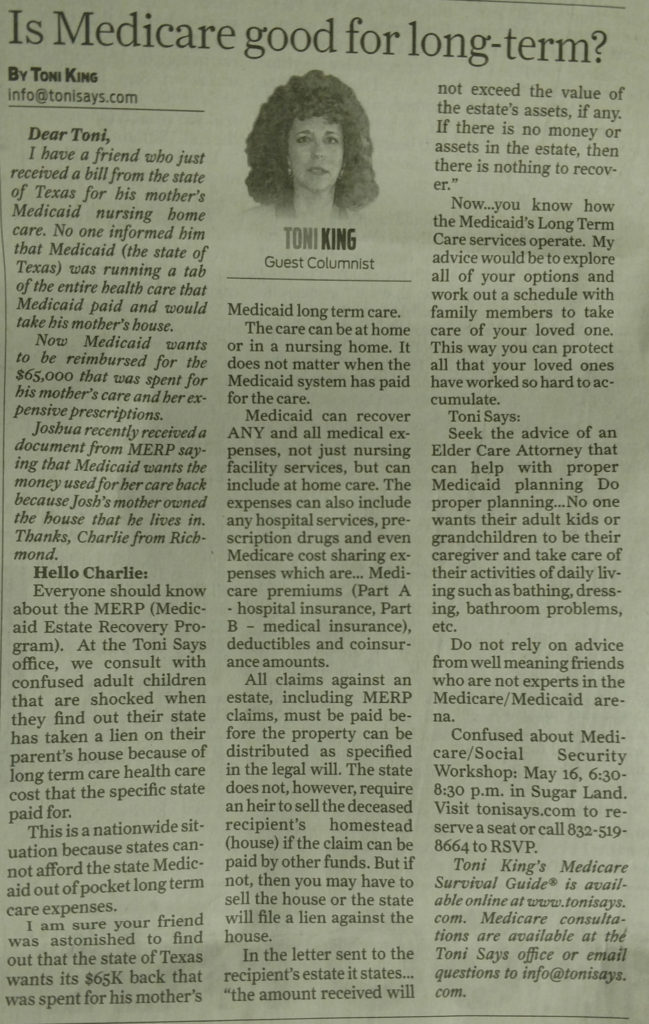Did you know that if your parent or anyone affording you an inheritance after they die were on Medicaid at any time, the state may have the right to take it away? I read the following article in my local newspaper this week. I knew this but I am sure there is a large percentage of people who don’t.
This is what middle-class, poor, and working-class America should be working on. Our social policies should not force someone to become poor to get medical care or to transfer their homestead. Policies like these are instrumental in keeping the people in poverty or unable to grow their wealth.

Here is the text from the newspaper cut out.
Dear Toni,
I have a friend who just received a bill from the state of Texas for his mother’s Medicaid nursing home care. No one informed him that Medicaid (the state of Texas) was running a tab of the entire health care that Medicaid paid and would take his mother’s house.
Now Medicaid wants to be reimbursed for the $65,000 that was spent for his mother’s care and her expensive prescriptions.
Joshua recently received a document from MERP saying that Medicaid wants the money used for her care back because Josh’s mother owned the house that he lives in. Thanks, Charlie from Richmond.
News Channel
Hello Charlie:
Everyone should know about the MERP (Medicaid Estate Recovery Program). At the Toni Says office, we consult with confused adult children that are shocked when they find out their state has taken a lien on their parent’s house because of long term care health care cost that the specific state paid for.
This is a nationwide situation because states cannot afford the state Medicaid out of pocket long term care expenses.
I am sure your friend was astonished to find out that the state of Texas wants its $65K back that was spent for his mother’s Medicaid long term care.
The care can be at home or in a nursing home. It does not matter when the Medicaid system has paid for the care.
Medicaid can recover ANY and all medical expenses, not just nursing facility services, but can include at home care. The expenses can also include any hospital services, prescription drugs and even Medicare cost sharing expenses which are… Medicare premiums (Part A – hospital insurance, Part B – medical insurance), deductibles and coinsurance amounts.
All claims against an estate, including MERP claims, must be paid before the property can be distributed as specified in the legal will. The state does not, however, require an heir to sell the deceased recipient’s homestead (house) if the claim can be paid by other funds. But if not, then you may have to sell the house or the state will file a lien against the house.
In the letter sent to the recipient’s estate it states… “the amount received will not exceed the value of the estate’s assets, if any. If there is no money or assets in the estate, then there is nothing to recover.”
Now…you know how the Medicaid’s Long Term Care services operate. My advice would be to explore all of your options and work out a schedule with family members to take care of your loved one. This way you can protect all that your loved ones have worked so hard to accumulate.
Toni Says:
Seek the advice of an Elder Care Attorney that can help with proper Medicaid planning Do proper planning; no one wants their adult kids or grandchildren to be their caregiver and take care of their activities of daily living such as bathing, dressing, bathroom problems, etc.
Do not rely on advice from well meaning friends who are not experts in the Medicare/Medicaid arena.
Viewers are encouraged to subscribe and join the conversation for more insightful commentary and to support progressive messages. Together, we can populate the internet with progressive messages that represent the true aspirations of most Americans.